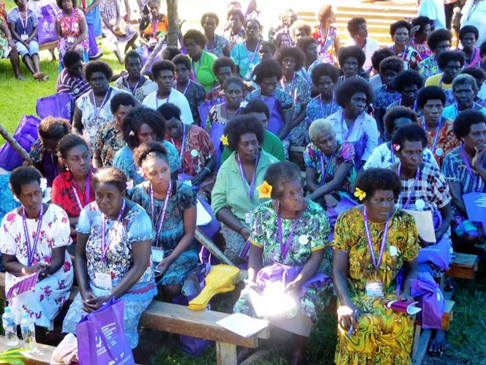Project Name: From Gender Based Violence to Gender Justice and Healing
Project partner: Nazareth Centre for Rehabilitation and International Women's Development Agency
Total funding: $1,693,366
Funding timeframe: 2015-18
Seventeen years ago, with just PGK1,000 in their pockets, the Sisters of Nazareth created a special place – the Nazareth Centre for Rehabilitation – that today benefits individuals and communities throughout Bougainville. With support from the Australian aid program's Pacific Women Shaping Pacific Development initiative, the Nazareth Centre for Rehabilitation (Nazareth Centre) has been able to expand its work with the International Women's Development Agency on initiatives to improve women's leadership and influence in their communities and support survivors of family and sexual violence.
The Nazareth Centre has trained a network of 498 women human rights defenders and 201 male advocates. These women and men work towards making their communities safer for women and children, drawing on their training on gender-based violence, human rights, women's rights, the role of women human rights defenders and peace and conflict resolution.
The women human rights defenders gather annually for a forum, to share their experiences and connect to a wider movement.
'Bougainville's Women's Human Rights Defender Network is growing every year', one participant explains. 'This forum allows space to support more women to join the movement.'
Many women human rights defenders have gone on to assume leadership roles in their communities, including 34 who were elected to community government in the April 2017 elections in Bougainville.
Women human rights defenders have contributed to changing violent attitudes and behaviours using Melanesian diplomacy to intervene in conflicts (including sorcery-related violence). They raise awareness on family and sexual violence, gender equality and human rights and provide basic counselling, referrals and response to survivors. Community decision makers have been influenced to take public action to address family and sexual violence issues.
Clients at the Nazareth Centre's four safe houses increased by 30 per cent between its first and second years of operation, reflecting both demand for services and increasing awareness that help is available. Its men's hub in Arawa offers counselling to young men and boys raised in abusive homes who are expressing negative sexual behaviours and using drugs and alcohol. There is high demand, with an average of 10 clients per day.
The Nazareth Centre's schools-based program helps teachers who feel uncomfortable teaching sexual and reproductive health. Modules that encourage students to set personal ambitions, provide information on sexual and reproductive health and offer guidance on leadership and governance are delivered by male advocate peer educators. The peer educators report that the program has 'whole villages' talking about sexually transmitted infections and teenage pregnancy and that there is less youth homebrew and drug consumption. Both boys and girls are now helping with cooking, laundry, carrying water and chopping firewood. Before, girls looked down on themselves and thought boys were better. Now, both are in leadership roles at school, including as prefects and class captains.

